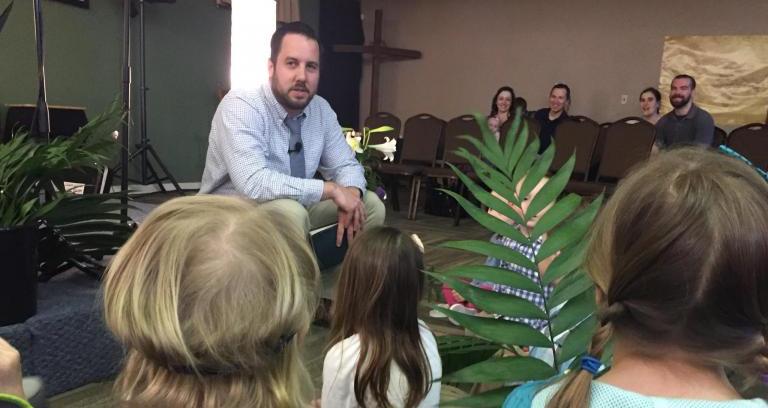Palm Sunday is one of those Sundays you look forward to as a kid. The church hands out freshly cut palm branches to wave around. You learn about the meaning of words like “Hosanna” and sing songs that include them. You hear the story of the Jesus’s triumphal entry into Jerusalem, riding on a donkey, with crowds cheering. You read Jesus’s clever line about the stones crying out if his disciples keep quiet.

Palm branches, donkeys, hosannahs, talking stones. There’s an almost festive spirit in the air. Palm Sunday marks a turning from a prolonged winter to the beginning of spring. Green leaves and flower buds have just begun to appear. You know that when Palm Sunday is here, Easter is just around the corner.
What sometimes gets lost in all of this is festivity is that Palm Sunday is the darkest Sunday of the year. It marks the beginning of Passion Week, the darkest week of Jesus’s life—and arguably the darkest week in the history of the world.
If you don’t have a Good Friday service—or if you don’t make it out to one—you jump straight from Palm Sunday to Easter Sunday. It all just seems joyful and triumphant. But when you realize that there’s no resurrection without crucifixion, Palm Sunday takes on a different feel.
Jesus has been warned repeatedly to stay away from Jerusalem lest he be assassinated. But, Luke tells us, he nevertheless presses “on toward Jerusalem, walking ahead of his disciples” (19:28).
As he enters, riding on a donkey, making almost a mockery of an imperial procession into the city, the crowd of his disciples cries out:
Blessings on the King who comes in the name of the Lord!
Peace in heaven, and glory in highest heaven! (19:38)
Their words echo those of the angelic choir—what Luke literally calls “the armies of heaven” (2:13)—on the night of Jesus’s birth. There, announcing God’s triumphal entry into the world in a baby born in a manger in Bethlehem, the angelic army sang to the shepherds:
Glory to God in highest heaven,
and peace on earth to those with whom God is pleased! (2:14)
But there’s a subtle difference between their two announcements. Where the angelic army announced glory in the highest heaven and peace on earth, Jesus’s disciples respond with glory in the highest heaven and peace in heaven.
Why this difference? Surely Luke realizes as he’s describing these parallel scenes that the angels speak of peace on earth, while the disciples speak of peace in heaven. I suggest that what accounts for the difference is this:
Jesus is the peace of God.
Filled with the Holy Spirit, Zechariah had prophesied over his baby son John:
You will tell his people how to find salvation
through forgiveness of their sins.
Because of God’s tender mercy,
the morning light from heaven is about to break upon us,
to give light to those who sit in darkness and in the shadow of death,
and to guide us to the path of peace. (1:77–79)
As so, when Jesus entered the world as a baby, the hosts of heaven looked down and shouted, There! There in that manger is where you will find God’s peace.
As the prophet Simeon held the baby Jesus in his arms in the temple, he praised God, saying,
Sovereign Lord, now let your servant die in peace,
as you have promised.
I have seen your salvation,
which you have prepared for all people. (2:29–31)
But over and over again, the people reject God’s peace. When Jesus declared good news to the poor and oppressed at his inaugural sermon in his hometown synagogue, a crowd formed a mob and tries to throw Jesus off a cliff. Later, when Jesus freed a man from demon possession, the townspeople asked Jesus to leave. At one point some Pharisees warn him, “Get away from here if you want to live! Herod wants to kill you!” (13:31). But Jesus defiantly and prophetically replies,
Go tell that fox that I will keep on casting out demons and healing people today and tomorrow; and the third day I will accomplish my purpose. Yes, today, tomorrow, and the next day I must proceed on my way. For it wouldn’t do for a prophet of God to be killed except in Jerusalem! (13:32–33).
Once Jesus sets his sights on Jerusalem, the opposition only intensifies. The closer to Jerusalem he gets, the greater the threats to his life. Finally, Jesus tells his twelve disciples plainly:
Listen, we’re going up to Jerusalem, where all the predictions of the prophets concerning the Son of Man will come true. He will be handed over to the Romans, and he will be mocked, treated shamefully, and spit upon. They will flog him with a whip and kill him, but on the third day he will rise again. (19:31–33)
So when Jesus has the disciples find him a donkey that he can ride into Jerusalem, he knows exactly what he’s doing. He knows exactly the fate that awaits him.
It’s less clear that the disciples fully understand what’s going on. But if not, they speak better than they know. It would be foolish of them to repeat the words of the angels at this point and cry out, “Peace on earth.” God’s peace has been on earth and he’s walked among them for thirty-three years. What the angels proclaimed that starry night was true. But the world has rejected that peace and is now sending him back to God by nailing him to a cross. And so, whether knowingly or not, the disciples proclaim not “peace on earth” but “peace in heaven,” for that is where God’s peace is being returned.
The world is saying, Thanks, but no thanks, God. We’ve seen your peace, but we’re going to go at this our own way. And so Jesus’s so-called triumphal entry is a moment of great sorrow for Jesus. As he reaches the destination of his long journey and sets his eyes at last on Jerusalem, the reality of his painful rejection overwhelms him.
Luke writes that as Jesus comes closer to Jerusalem and sees the city ahead, he begins to weep (19:41). Overwhelmed with grief, Jesus cries out at the city:
How I wish today that you of all people would understand the way to peace. But now it is too late, and peace is hidden from your eyes. Before long your enemies will build ramparts against your walls and encircle you and close in on you from every side. They will crush you into the ground, and your children with you. Your enemies will not leave a single stone in place, because you did not recognize it when God visited you. (19:42–44)
Five days later, the powers that be have Jesus arrested and brutally executed, and the peace of God returns to heaven from whence it came. About 35 years later, Rome lays siege to Jerusalem, and the city and its Temple are burned to the ground, thus fulfilling Jesus’s prophecy.
It would be easy for us nearly 2000 years later to point fingers and condemn the folly and hardheartedness of the people of Jerusalem for failing to recognize God’s peace when he walked among them. But the reality is that those of us who go by the name Christian, or little Christ, often fail to recognize the peace of Christ that we proclaim.
Our national myth declares that peace comes through strength.
And Jesus cries out, How I wish today that you of all people would understand the way to peace!
Our national myth declares that peace comes through security.
And Jesus cries out, How I wish today that you of all people would understand the way to peace!
Our national myth declares that peace comes through law and order.
And Jesus cries out, How I wish today that you of all people would understand the way to peace!
Our national myth declares that peace comes through borders.
And Jesus cries out, How I wish today that you of all people would understand the way to peace!
Our national myth declares that peace comes through economic prosperity.
And Jesus cries out, How I wish today that you of all people would understand the way to peace!
Our national myth declares that peace comes through the destruction of our enemies.
And Jesus cries out, How I wish today that you of all people would understand the way to peace!
Our national myth declares that peace comes through the elimination of the other—the one who looks, talks, and prays differently than us.
And Jesus cries out, How I wish today that you of all people would understand the way to peace!
We are living in a time when peace seems elusive and always out of reach. There’s violence and turmoil throughout the world, across our nation, and within our community, families, and our own hearts. Our temptation in these times is to cling to our national myths, but Jesus calls us instead to look to him as the only way to lasting peace. May we do so now before it is too late, and peace is hidden from our eyes, because we failed to recognize it when God visited us.












